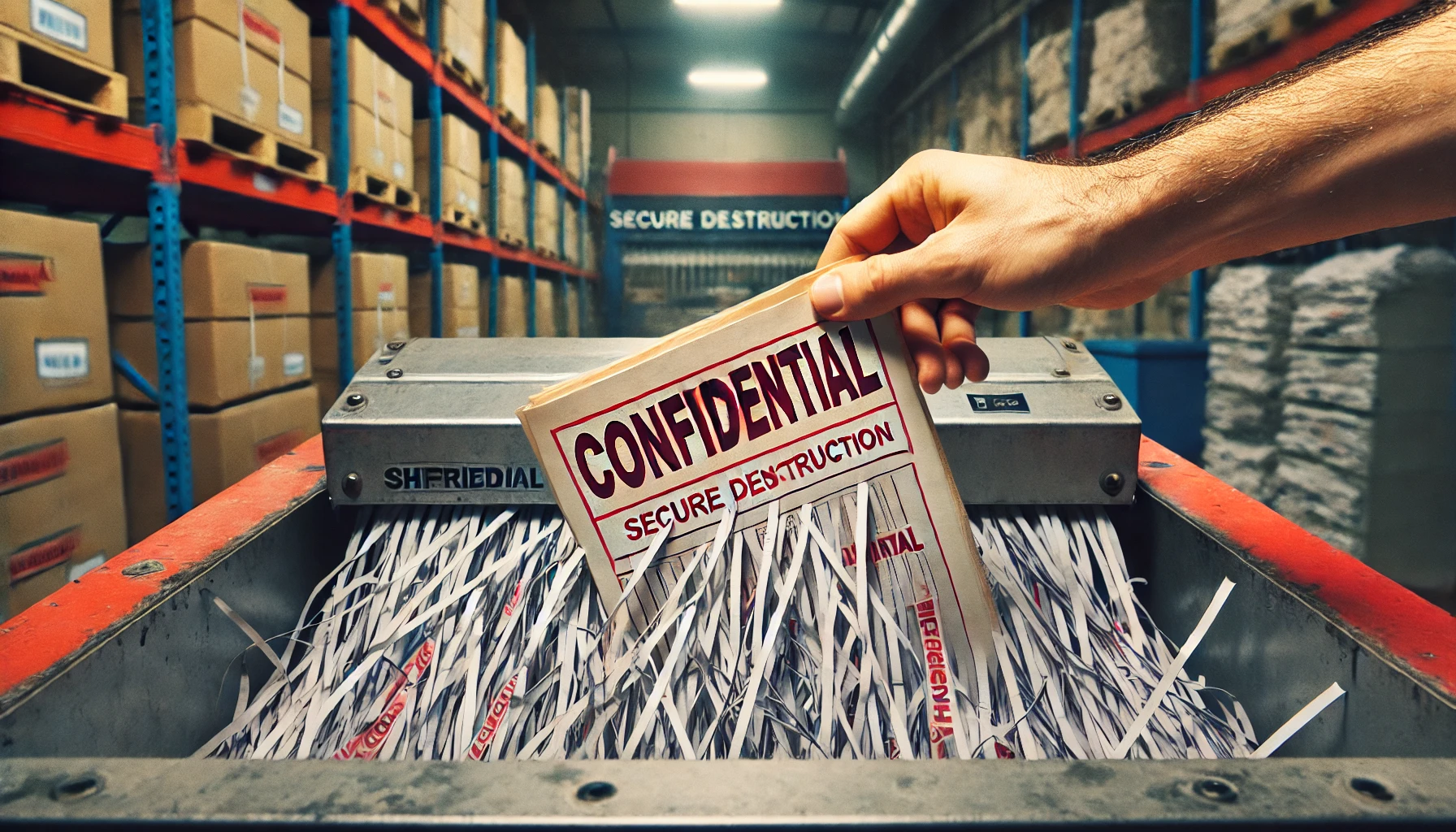The importance of confidentiality cannot be overstated. Legal documents often contain sensitive information that, if mishandled, can lead to significant risks and consequences.
This article explores why confidentiality matters, the dangers of improper document disposal, and effective shredding techniques.
It provides a step-by-step guide on how to properly shred legal documents, discusses the benefits of professional shredding services, and outlines best practices for maintaining confidentiality.
Ensure your legal practices are secure and compliant by understanding these vital strategies.
The Significance of Confidentiality in Legal Documents
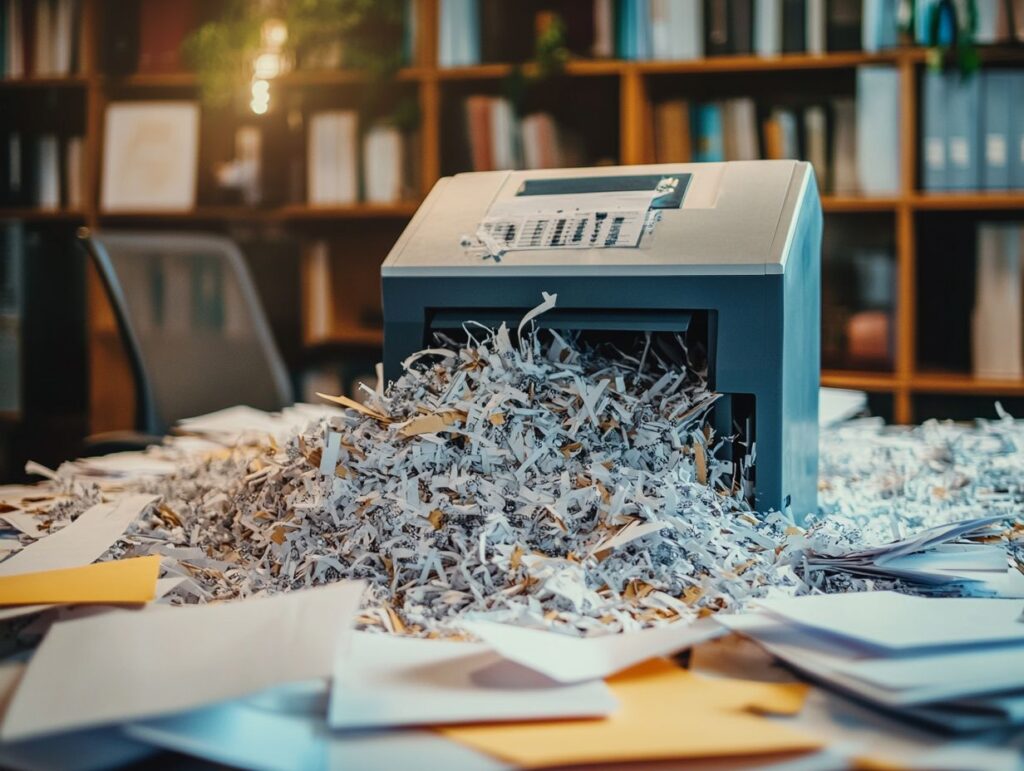
Confidentiality in legal documents is fundamental to establishing trust and security, as it safeguards sensitive information from unauthorized access and potential breaches. In the contemporary digital environment, where identity theft and data breaches are increasingly common, the maintenance of confidentiality is crucial not only for client privacy but also for compliance with applicable privacy laws.
Adequate data protection enhances stakeholder trust and underscores the firm’s commitment to ethical practices and information security. Legal professionals are required to implement rigorous confidentiality measures, ensuring that all sensitive materials are managed with the highest level of care to protect both client interests and corporate integrity.
Why Confidentiality Matters in Legal Settings
In legal contexts, confidentiality is of utmost importance, as it governs the management of sensitive materials and establishes the framework for legal obligations and corporate ethics.
This critical element ensures that all parties involved can place their trust in the legal system, facilitating open communication without the apprehension of adverse consequences.
When confidentiality is compromised, it not only jeopardises the integrity of the information lifecycle but also raises significant concerns regarding the ethical conduct of legal professionals. Such breaches can result in severe legal repercussions, including potential penalties that range from the revocation of licences to substantial financial liabilities.
Unauthorised disclosure of sensitive information can adversely affect reputations and undermine client trust, making it imperative for legal practitioners to diligently uphold the principles of confidentiality.
The Risks of Improper Document Disposal
Improper document disposal presents substantial risks, including identity theft, data breaches, and increased corporate liability, all of which can undermine a company’s reputation and operational integrity.
Organisations that manage sensitive information may find that inadequate disposal methods can lead to unauthorised access to confidential documents, resulting in significant legal and financial repercussions.
It is essential for organisations to understand the risks associated with improper disposal as part of effective risk management. This understanding enables companies to implement robust shredding policies and secure data disposal practices.
Potential Consequences of Mishandling Legal Documents
Mishandling legal documents can result in significant consequences, including loss of regulatory compliance, compromised information security, and potential legal liability for the organisation.
For instance, if a company fails to adequately safeguard sensitive client information, it may face substantial fines and irreparable damage to its reputation, as evidenced by numerous data breach cases. Regulatory bodies frequently impose hefty penalties on businesses that neglect their compliance obligations, leading to severe financial strain. Inadequate documentation practices may result in lapses in oversight, ultimately exposing the organisation to lawsuits from affected parties.
The ramifications of such mismanagement can extend across various departments, undermining internal operations and eroding trust among clients and stakeholders—an outcome that no organisation seeks to experience.
Methods of Document Destruction
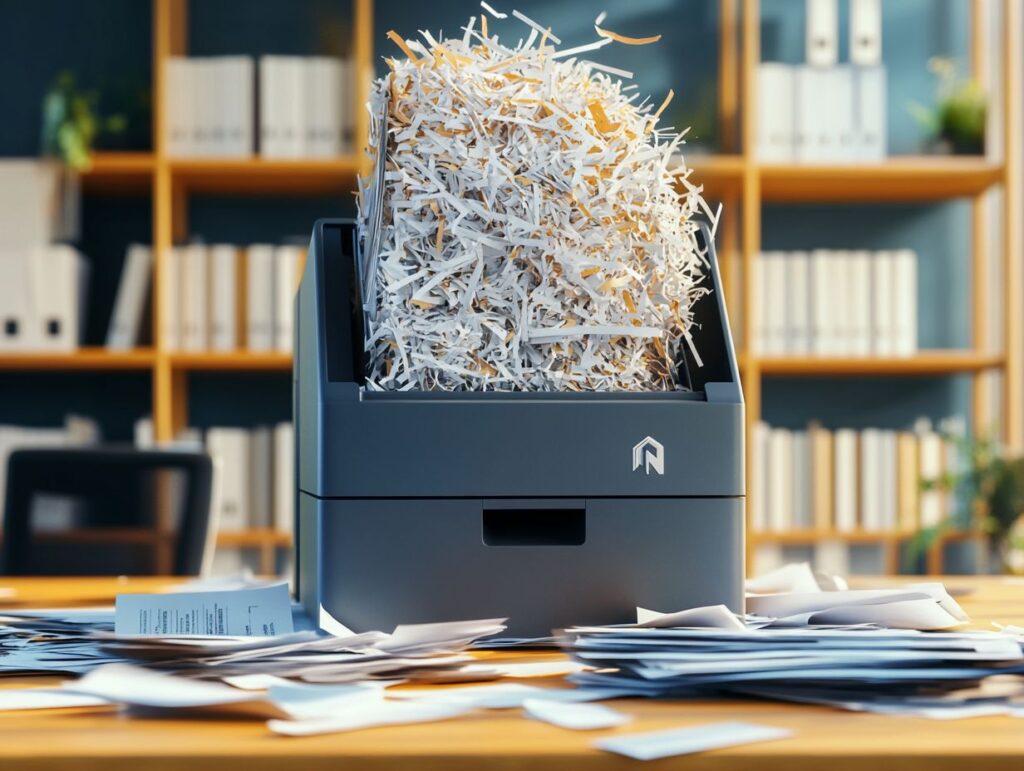
Various methods of document destruction are available, each specifically designed to ensure the secure disposal of sensitive information, whether through traditional paper shredding or contemporary digital shredding techniques.
As organisations prioritise information security and regulatory compliance, the selection of an appropriate shredding method becomes essential to mitigate risks associated with identity theft and unauthorised access.
A comprehensive understanding of the advantages and disadvantages of each method enables organisations to implement effective shredding policies that align with their operational requirements and commitment to environmental responsibility.
Comparing Different Document Shredding Techniques
When comparing various document shredding techniques, it is essential to evaluate their effectiveness, security features, and impact on environmental responsibility, particularly when selecting shredding services.
Understanding the distinctions between methods such as cross-cut and micro-cut shredding can significantly assist in making informed decisions. Cross-cut shredders cut documents into small pieces, making reconstruction more challenging, while micro-cut shredders take this a step further by producing confetti-like particles that ensure maximum confidentiality.
For corporations, utilising these advanced shredding techniques not only helps mitigate risks associated with identity theft but also aligns with environmentally sustainable practices by facilitating better recycling opportunities for the shredded materials.
As businesses increasingly prioritise data security, assessing the implications of each shredding method can enhance compliance with privacy regulations and foster trust among stakeholders.
The Process of Legal Document Shredding
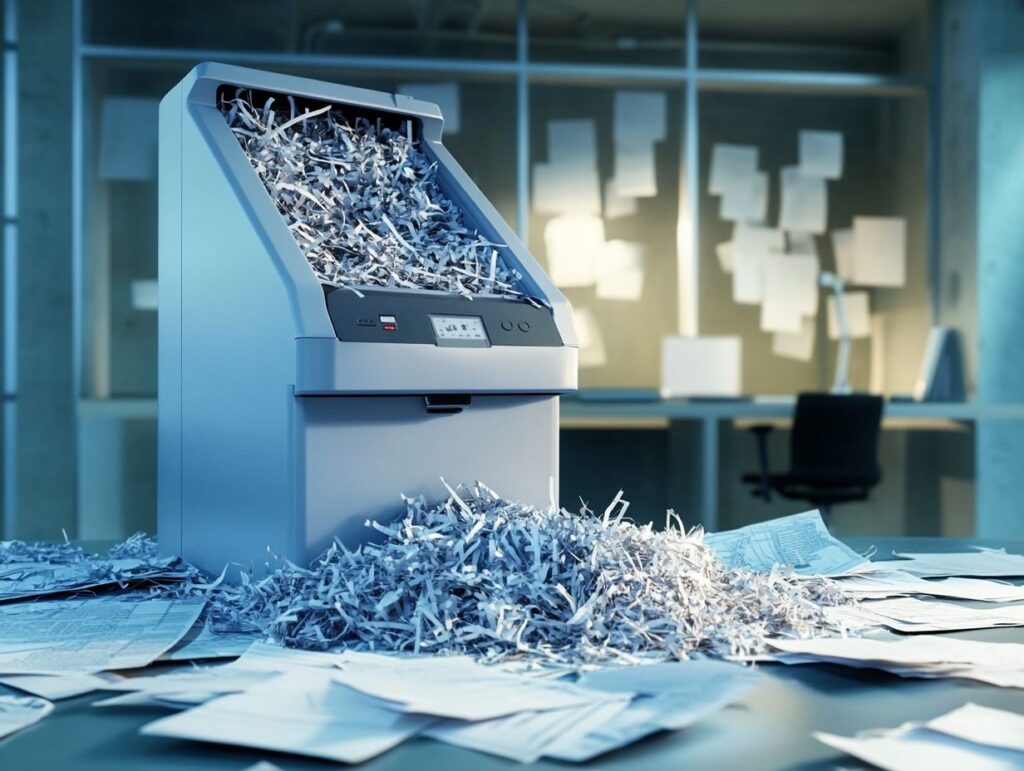
The process of legal document shredding entails rigorous shredding protocols designed to uphold a secure chain of custody throughout the destruction process, thereby ensuring compliance with legal obligations and data protection standards.
Organisations are required to document each step, from collection to destruction, in order to provide destruction certificates that verify the secure handling of sensitive materials.
This systematic approach not only protects the integrity of information but also strengthens corporate security policies and enhances risk management practices.
Step-by-Step Guide to Properly Shredding Legal Documents
A systematic guide for the proper destruction of legal documents entails the implementation of comprehensive protocols and the engagement of reliable shredding services to establish secure environments for document disposal.
This thorough approach significantly mitigates the risk of sensitive information being compromised and reinforces the organisation’s dedication to data protection and regulatory compliance. It is imperative that employees receive training on the importance of adhering to these procedures, with precise instructions regarding the identification of legal documents that require destruction.
Regular audits and compliance checks are crucial for maintaining audit trails, thereby ensuring adherence to relevant regulations, such as GDPR or HIPAA.
Furthermore, the adoption of a systematic tagging procedure, combined with the scheduling of regular shredding days, can considerably enhance both efficiency and accountability in the document destruction process.
Benefits of Professional Document Shredding Services
Professional document shredding services provide a range of benefits, including secure data disposal, minimised risk exposure, and the assurance that sensitive information is managed by qualified experts.
Advantages of Outsourcing Document Destruction
Outsourcing document destruction offers a multitude of advantages, including the reduction of corporate liability and the assurance of ethical practices in data management. By delegating this essential function to specialised providers, organisations can significantly mitigate the risk of data breaches, which may result in substantial financial losses and damage to reputation.
These experts not only employ advanced technology to ensure a thorough and compliant destruction process but also remain informed about the continually evolving landscape of privacy laws. This proactive strategy enables organisations to adhere to regulations such as GDPR and HIPAA, thereby safeguarding sensitive information.
Ultimately, outsourcing these services enhances corporate security, allowing businesses to concentrate on their core operations while ensuring that their data management practices align with the highest standards of ethics and responsibility.
Ensuring Compliance with Legal Regulations
Ensuring compliance with legal regulations is imperative for organisations that handle sensitive information, as these regulations dictate their shredding practices and data retention policies.
Understanding Relevant Laws and Regulations
Understanding the relevant laws and regulations governing document disposal and shredding is essential for ensuring legal compliance and safeguarding data privacy.
These guidelines are not merely legal formalities; they constitute the foundation of a comprehensive data protection strategy that businesses must implement to protect sensitive information. Various legislations, such as the Health Insurance Portability and Accountability Act (HIPAA) for health records and the General Data Protection Regulation (GDPR) for personal data, specify the requirements for the proper handling and disposal of documents. Non-compliance with these regulations can result in significant penalties, including substantial fines and reputational damage, which can undermine trust with clients and stakeholders.
Consequently, conducting regular privacy audits is imperative, as these audits assist organisations in evaluating their shredding practices and ensuring compliance with these laws, ultimately reinforcing their commitment to data protection.
Best Practices for Maintaining Confidentiality
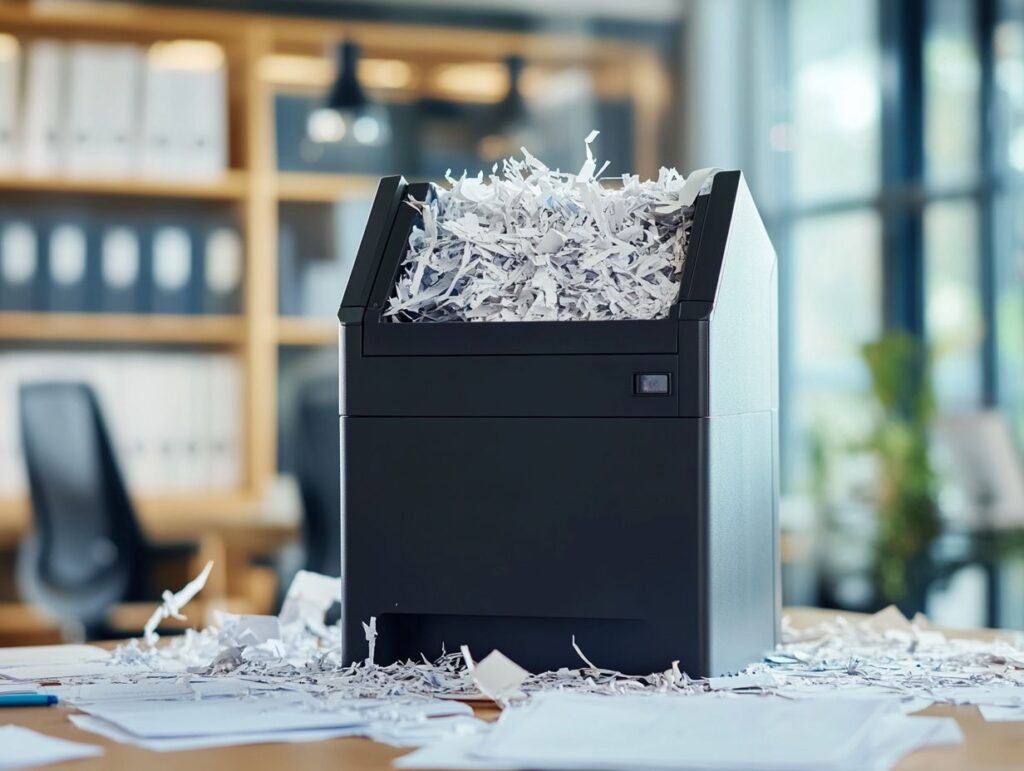
Maintaining confidentiality is essential for organisations that handle sensitive information. Implementing best practices for privacy protection can substantially reduce the risks associated with information breaches.
Tips for Safeguarding Sensitive Legal Information
Safeguarding sensitive legal information necessitates a comprehensive approach that includes employee training, the establishment of secure environments, and the implementation of effective risk management strategies.
These measures are essential to ensure that confidential data remains protected from unauthorised access and potential breaches. Employees must be thoroughly trained in best practices for handling sensitive documents and must understand the importance of maintaining confidentiality in both physical and digital formats.
Fostering a culture of security awareness can give the power to staff members to recognise threats and report any suspicious activities. Additionally, investing in secure storage solutions, such as locked filing cabinets for physical documents and encrypted systems for digital files, can significantly enhance an organisation’s defences.
Ultimately, by prioritising information security, legal entities can cultivate trust and reliability within their operations.
Frequently Asked Questions
What is the importance of legal document shredding for confidentiality?
Legal document shredding is crucial for maintaining confidentiality in sensitive matters. It ensures that private information is not accessible to unauthorized individuals or entities, preventing potential data breaches and legal repercussions.
Can’t we just dispose of legal documents in a regular trash bin?
No, disposing of legal documents in a regular trash bin is not secure. It leaves the documents vulnerable to theft and can compromise the confidentiality of the information contained within them. Shredding is the only foolproof way to ensure complete destruction of sensitive documents.
What are the potential consequences of not shredding legal documents?
Not shredding legal documents can result in a breach of confidentiality, leading to identity theft, fraud, and legal consequences. It can also damage the reputation and trust of individuals and organizations involved in the matter.
How often should legal document shredding be done?
The frequency of legal document shredding depends on the volume of documents being generated and the sensitivity of the information. It is recommended to shred documents on a regular basis, at least once every quarter, to stay on top of document disposal and maintain confidentiality.
Is legal document shredding environmentally friendly?
Yes, legal document shredding is an environmentally friendly option for disposing of paper documents. The shredded paper is often recycled, reducing the amount of waste in landfills and promoting sustainability.
Can professional shredding services ensure confidentiality?
Yes, professional shredding services have protocols in place to ensure the confidentiality of documents. They use secure shredding methods and have strict chain-of-custody procedures to protect sensitive information from falling into the wrong hands.

